“If I believe in anything, it is in the dark night of the soul. Awe is my religion, and mystery is its church.”
– Charles Simic
“If I believe in anything, it is in the dark night of the soul. Awe is my religion, and mystery is its church.”
– Charles Simic
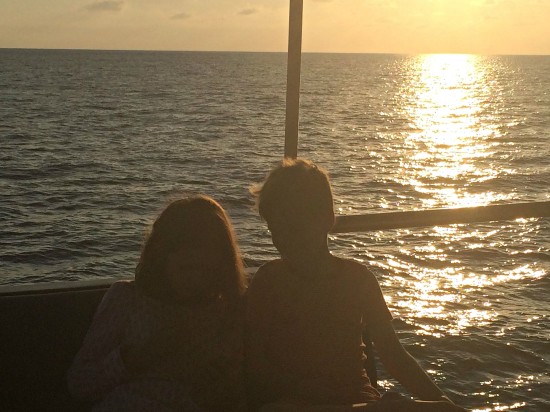
Annie Dillard has been one of my very favorite writers for a long, long time. A search of this blog’s archives brings up fully 2 pages of posts that reference her. It is frankly inexplicable, then, that I hadn’t read An American Childhood before. Perhaps the reason is that I was waiting for the precisely perfect moment to read it, which was last month in the Galapagos. The universe conspired so that I read this book, which is about a child awakening to the miracle of the world and of how transient it is, about moving into adolescence, about memories that we never forget, right as I watched my own near-adolescent children in open-mouthed wonder at the glorious view in front of them. I can’t count the number of times I breathlessly underlined a passage about the bittersweet awe of childhood and then looked up to marvel at my own children, willing myself to freeze them, and that experience, that moment, perfectly in my memory.
An American Childhood, Dillard’s loving, lovely memoir of her childhood in Pittsburgh, is about the central theme of my life, about the black hole around which my every thought, emotion, tear, and word revolves: time’s irrevocable, speedy passage. Pittsburgh is far from the Galapagos, and I am certainly no Annie Dillard, but it speaks to the brilliance and power of her writing that I fell into her story headfirst and related to something on every single page.
Time’s passage is the drumbeat cadence of the book, and fascination with the holiness that exists in the natural world is its soaring descant. I am familiar with how breathtakingly beautifully Dillard evokes the sacred that is inherent in nature, but this was the first time I’d been moved so by her writing about life’s ephemeral transience.
Who could ever tire of this radiant transition, this surfacing to awareness and this deliberate plunging to oblivion – the theater curtain rising and falling? Who could tire of it when the sum of those moments at the edge – the conscious life we so dread losing – is all we have, the gift at the moment of opening it?
An American Childhood is suffused with this radiance, tracing one girl’s “surfacing” from young childhood to a more aware, and more complicated adolescence. At the outset of the book, by recording a “few, floating scenes from early childhood,” Dillard brings a complete world vividly to life: her neighbor skating in the street during an ice storm, her mother addressing a phalanx of nuns, the light of a passing car across a dark wall, her barrel-chested, particular grandmother, Oma.
And then, as Dillard gets older, she describes a change that occurs around the double digit mark. She begins to understand the world and her place in it. This transition is a kind of awakening, and it brings both great appreciation for the world and a keen awareness of how short-lived our time here is. With that awareness, which is intensely familiar to me, comes a fierce, ferocious need to pay attention to the world:
Noticing and remembering everything would trap bright scenes to light and fill the blank and darkening past which was already piling up behind me. The growing size of that blank and ever-darkening past frightened me; it loomed beside me like a hole in the air and battened on scraps of my life I failed to claim. If one day I forgot to notice my life, and be damned grateful for it, the blank cave would suck me up entire.
“What does it feel like to be alive?” Dillard asks midway through An American Childhood. And this felt like a manifesto, a summary of all that she works out in her writing: what it is to be alive in this world. This question, which is also a preoccupation of mine, throbs through everything I’ve ever read by Dillard. Then she answers her own question:
It is time pounding at you, time. Knowing you are alive is watching on every side your generation’s short time falling away as fast as rivers drop through air, and feeling it hit … knowing you are alive is feeling the planet buck under you, rear, kick, and try to throw you; you hang onto the ring….you feel time as a stillness about you, and hear the silent air asking in so thin a voice, Have you noticed yet that you will die? Do you remember, remember, remember?
Dillard was clearly a hyper-aware child and probably one with a melancholy streak too. It is books and nature that bring her the most joy; she talks about scanning the shelves at the local library and about her rock collection with the same passionate nostalgia. As an adult reflecting on her child self, she realizes the fine line she walked, between observing the world and living in it: “How much noticing could I permit myself without driving myself round the bend? Too much noticing and I was too self-conscious to live … too little noticing, though – I would risk much to avoid this – and I would miss the whole show.”
This tension is one I grapple with all the time The border between watching my life and experiencing it is both porous and shifting. I need to do one to do the other, that much is clear to me, but the balance between them that feels right changes daily, if not hourly.
An American Childhood moves forward through Dillard’s adolescence, and we see the entrance of boys, and dances, and the beginning of a new kind of drama. She talks about deeply loving two men, and she loses grandparents. She shows us the way that “loss grew as you did, without your consent,” and as the child author grows into a young woman we see her increasing familiarity with the two sides of this world, both beauty and pain. Indeed, she notes, “time itself bent you and cracked you on its wheel.”
I closed An American Childhood with an ache in my chest, that sensation of having read something so true it hurts. I looked over at the glow of the Galapagos sunset on the faces of my children and felt the fascination and sorrow of this life running together in my veins. I cannot recommend highly enough Dillard’s love letter to childhood, to reading, to nature, to this world in all of its myriad, multifaceted beauty. In the last pages she describes a feeling which sums up what reading An American Childhood is like: “It is the dizzying overreal sensation of noticing that you are here. You feel life wipe your face like a brush.”
In the Galapagos, life wiped my face. Reading An American Childhood, it did too. It is my belief that in those dizzying, overreal sensation, we are truly living.
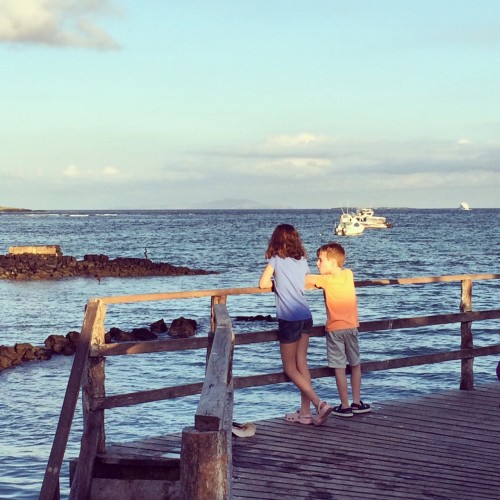
We had a spectacular spring break. The trip to the Galapagos was more magical than our everyday life, of course, and Grace and Whit, sponges that they are, soaked it all up. As we headed home, on the last morning, Grace was tearful. In the airport lounge (as we embarked on what would be a full 24 hours of travel) she looked at me with mournful eyes. “I don’t want it to be over,” she said, hugging me hard. I nodded, my own eyes filling with tears.
“Why does it have to end? Why does it have to be so sad?” she asked me, her voice muffled against my shoulder. A wry smile flitted across my face, though she couldn’t see it. Why does it? This is something I ask myself every single day.
“Oh, Gracie. You can’t have one without the other,” I said. She pulled away and looked me in the eye, a question in her face. “You know, the amazing experience is part of it and then being sad it’s over is the other part.” She nodded silently, chewing her lip. We sat in silence, the huge ceiling fans in the Guayaquil airport spinning slowly overhead. I watched Grace’s knee jiggle as I thought of the two edges of this world, of the joy and the sorrow, of the beauty and the pain, of how inextricably linked they are, of how ambivalent I feel that my daughter is learning this lesson already.
******
The last night of break, Whit came out of his room a few minutes after I had tucked him in. I walked him back into his dark room and sat down on the edge of his bed. “What’s on your mind?” His cheeks were wet and he had clearly been crying. He shook his head and I waited.
“I want to go back to the Galapagos, Mummy. And I am just sad. Sad about everything that’s over.” I stroked his blond hair off his forehead. “I’m sad we’re not going back to Legoland.” I nodded.
“I know, Whit. It’s always sad when things are over.” I had a lump in my own throat as I spoke. Over and over again, Grace and Whit seem to go straight to the heart of all the things I find the most difficult. This is what they do: they drag me to confront the emotions with which I most struggle.
“So many things,” he hiccuped, “that didn’t seem that much fun at the time, like the hot slow bus to the turtle farm, or the long layover in Guayaquil, or the flight where we didn’t sleep…” his voice trailed off.
“Or that lunch in Puerto Ayora when you were so cranky,” I offered, and a small smile cracked his face.
“Yeah. All of those things. They didn’t seem that much fun when we were going them, but now I miss them all.”

Happiness isn’t something you experience; it’s something you remember. – Oscar Levant
I read this quote the day after that bedtime conversation with Whit, and I think it’s saying what he was, too. So often things take on the sheen of joy after the fact, their memory burnished with something that wasn’t necessarily there as we lived it. I don’t think this is a bad or a sad thing, though it does make me more aware that the experiences that feel like a slog (and Whit is right, that long bus ride back and forth across Santa Cruz qualifies) often become cherished memories.
It’s all connected, all of it: the delight and the sorrow, the experience and the memory, the difficulty fading into the background as the joyful center of an experience moves to the front. You can’t have one without the other, of any of these dualities, of that I’m sure. It’s a bittersweet thing, to watch my children learn this, and they both did on our trip to the Galapagos and in its wake. And it’s something I’m still learning, too.
We have some happy days and some unhappy days, some great loves and barren spaces. We have this life, this instantaneous blossoming. Will I ever learn not to choose among its moments, will I ever learn to walk both its hollow and hilly lands?
– Ellen Gilchrist, Starcarbon
I have been blogging so long that some quotes and poems are making their second appearance here. I’m sorry if this is redundant; it’s just that I love them so much!
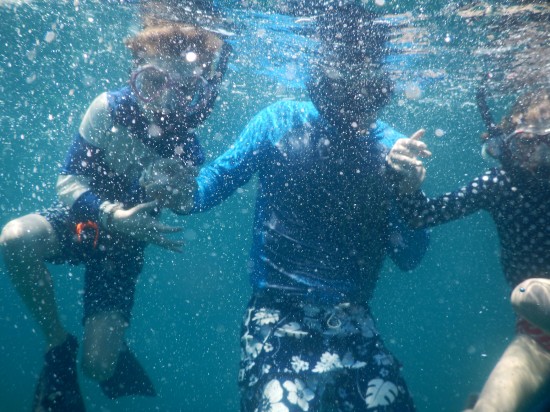
“Mummy!” Whit spluttered as he came up, blowing water out of his mouth, his snorkel mask askew. “Look!” He indicated below where he was treading water. Simultaneously we ducked under. I looked over and watched him gazing at the school of fish swarming along the bottom of the ocean. The wonder was palpable in his eyes.
When I broke the surface I saw Matt and Grace floating on the surface a few feet off to my left. We were in the Galapagos Islands. The clear, turquoise water was even more extraordinary than I had imagined. We had just spent 20 minutes only feet away from four baby sea lions who tumbled over each other and themselves in the shallow water at the rocky shore of an island. Grace had watched them, marveling at how close they were, gasping and exclaiming out loud over and over. Finally they had swum away and so had we.
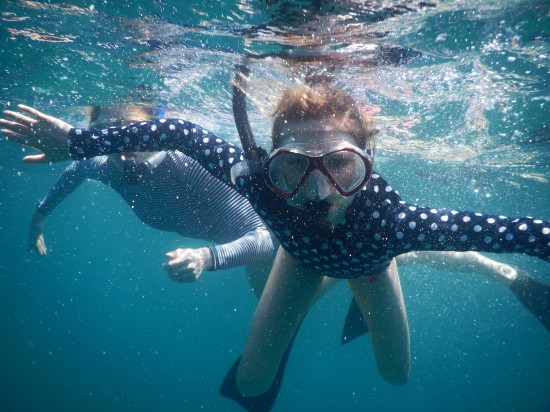
My favorite part of this beautiful afternoon was the way the sunlight slanted through the water. The tangible beams reminded me of the way you could see light coming through the windows of one of the big lecture halls at college, somehow solid, real, floating with dust motes and years and years of memories. This light was similarly visible, and I watched Grace, Whit, and Matt kick their way through the slanting skeins. The bubbles that our kicking created sparkled like tiny diamonds in the water.
I hung back, watching my family swim. Sometimes, though rarely, I am aware even as I live a moment that it will be one that swells and takes on shape and solidity in memory, something I return to, a touchstone of a season in time. I have come to think of this sensation as the closest thing I know to grace. It came over me then, in the empty Galapagos ocean. (note: this is different, though related to, the sensation that I’m living, alongside my children, a Life Lesson, like in the hockey rink)
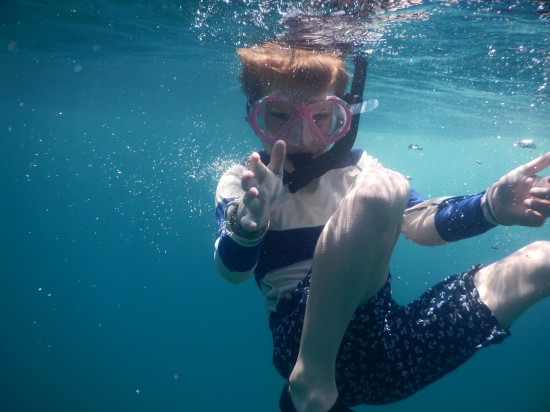
Grace looked like a long, lean mermaid as, her courage growing, she dove down below the surface, the silvery fish parting as she neared. Whit’s seersucker swim trunks ballooned around his pale legs as he bicycled in the water. I kept my head down, watching them swim, the only sound my own breathing through the snorkel. Suddenly William Styron’s seminal, powerful book, Darkness Visible, came to mind and I thought: this is lightness visible. In every sense of the word. The light streaking through the water, the silver fish glinting as they glided over the ocean floor, the glittering bubbles, my children learning something new in a place so far from home I’d described it before we left as the dark side of the moon.
I kept watching, head down, my own breathing loud in my ears, for another long while. And then we all swam back to the dinghy, climbed in, and headed home to the boat for the evening.
Photo credit: William Rice